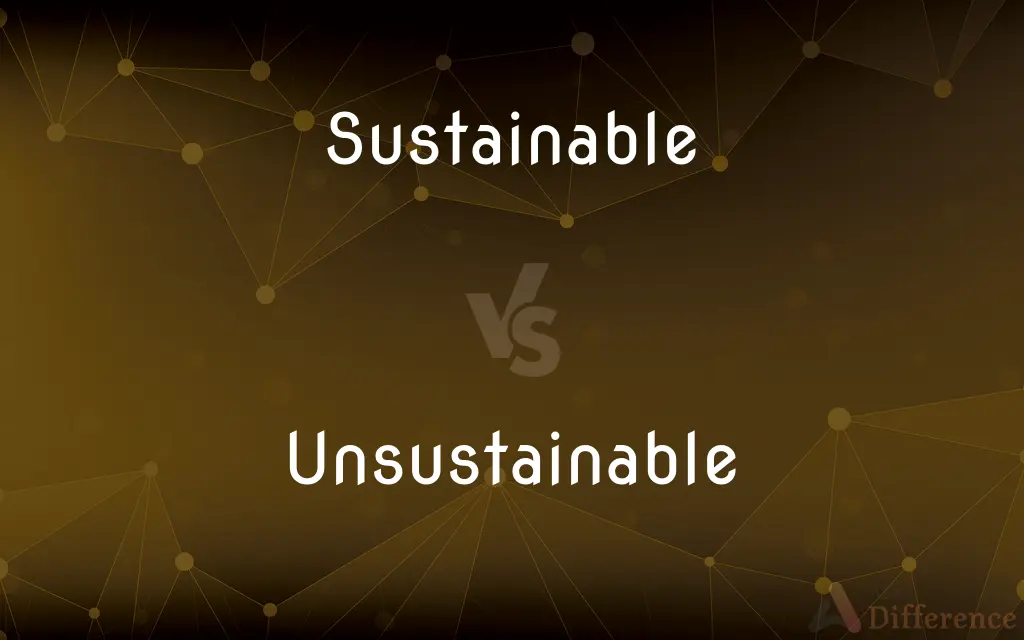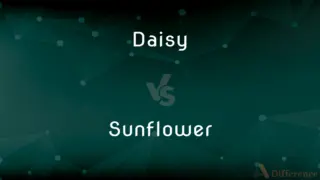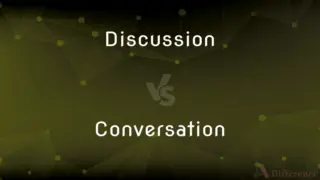Sustainable vs. Unsustainable — What's the Difference?
By Tayyaba Rehman & Maham Liaqat — Updated on April 17, 2024
Sustainable practices ensure long-term environmental balance and resource availability, whereas unsustainable ones deplete resources, harming ecosystems.

Difference Between Sustainable and Unsustainable
Table of Contents
ADVERTISEMENT
Key Differences
Sustainable practices prioritize the use of resources in a way that does not deplete them for future generations, ensuring ecological balance and long-term viability. In contrast, unsustainable practices exploit resources at a rate faster than their natural replenishment, leading to eventual depletion and ecological damage.
Sustainable methods often incorporate renewable energy sources, such as solar or wind power, which have minimal environmental impact. On the other hand, unsustainable methods rely heavily on fossil fuels, which contribute to pollution and are limited in supply.
In agriculture, sustainable practices might include crop rotation and the use of natural pest controls, which help maintain soil health. Unsustainable agriculture, however, often uses intensive monoculture and heavy chemical pesticides that can degrade soil quality and harm biodiversity.
In terms of economic models, sustainability advocates for economic activities that can be maintained without harmful impacts on society or the environment. Conversely, unsustainable economic practices may yield short-term gains at the expense of long-term environmental and social health.
Sustainable development involves planning and actions that aim to meet human needs while preserving the environment so that these needs can be met not only in the present but also for future generations. Unsustainable development disregards this balance, focusing on immediate benefits without regard to long-term consequences.
ADVERTISEMENT
Comparison Chart
Resource Use
Utilizes renewable resources
Relies on finite resources
Environmental Impact
Minimal and controlled
Often extensive and damaging
Economic Model
Focuses on long-term viability
Prioritizes short-term gains
Energy Sources
Renewable (e.g., solar, wind)
Non-renewable (e.g., coal, oil)
Agricultural Practices
Promotes biodiversity and soil health
May degrade biodiversity and soil
Compare with Definitions
Sustainable
Aims to maintain ecological balance.
Sustainable fishing quotas protect fish populations.
Unsustainable
Practices that lead to the depletion of natural resources.
Overfishing is an unsustainable practice.
Sustainable
Involves methods that do not lead to environmental degradation.
Sustainable farming avoids chemical pesticides.
Unsustainable
Economic activities that might cause future resource crises.
Relying solely on fossil fuels is unsustainable.
Sustainable
Promotes renewable energy use.
Solar panels are a hallmark of sustainable building designs.
Unsustainable
Causes significant environmental harm.
Clear-cutting forests is considered unsustainable.
Sustainable
Utilizes resources to meet current needs without compromising future generations.
Using wind turbines to generate power is a sustainable practice.
Unsustainable
Uses energy sources that are finite and polluting.
Coal power plants are an unsustainable energy source.
Sustainable
Ensures economic activities are viable in the long term.
Investing in sustainable technologies supports economic stability.
Unsustainable
Often ignores the long-term ecological consequences.
Overuse of groundwater for irrigation is unsustainable.
Sustainable
Capable of being sustained.
Unsustainable
Not sustainable.
Sustainable
Capable of being continued with minimal long-term effect on the environment
Sustainable agriculture.
Sustainable
Able to be sustained.
Sustainable
Able to be produced or sustained for an indefinite period without damaging the environment, or without depleting a resource; renewable.
Sustainable economy
Sustainable
A renewable energy source.
Sustainable
Capable of being sustained or maintained; as, the action is not sustainable.
Sustainable
Capable of being sustained
Common Curiosities
What makes a practice unsustainable?
When it depletes resources faster than they can be naturally replenished.
Why are sustainable practices important?
They ensure the long-term health and viability of ecosystems and human societies.
Can unsustainable practices be modified to become sustainable?
Yes, through technological innovations and changes in methods.
What role do governments play in promoting sustainability?
They can enforce regulations and provide incentives for sustainable practices.
What are examples of sustainable energy sources?
Solar, wind, and hydroelectric power are all sustainable energy sources.
Is recycling a sustainable practice?
Yes, recycling helps reduce waste and conserve natural resources.
How do sustainable practices affect the economy?
They can create jobs in renewable industries and ensure long-term economic health.
What is sustainable agriculture?
It uses techniques that maintain soil health and reduce environmental impact.
Why is energy consumption a sustainability issue?
Because unsustainable energy sources are limited and damaging to the environment.
What is a sustainable resource?
A sustainable resource is used at a rate that allows it to regenerate and sustain its availability for future use.
What are the risks of unsustainable practices?
They can lead to environmental degradation, resource scarcity, and economic instability.
What is sustainable development?
Development that meets the needs of the present without compromising the ability of future generations.
How do unsustainable practices impact biodiversity?
They can lead to habitat destruction and loss of species.
Share Your Discovery

Previous Comparison
Daisy vs. Sunflower
Next Comparison
Discussion vs. ConversationAuthor Spotlight
Written by
Tayyaba RehmanTayyaba Rehman is a distinguished writer, currently serving as a primary contributor to askdifference.com. As a researcher in semantics and etymology, Tayyaba's passion for the complexity of languages and their distinctions has found a perfect home on the platform. Tayyaba delves into the intricacies of language, distinguishing between commonly confused words and phrases, thereby providing clarity for readers worldwide.
Co-written by
Maham Liaqat













































